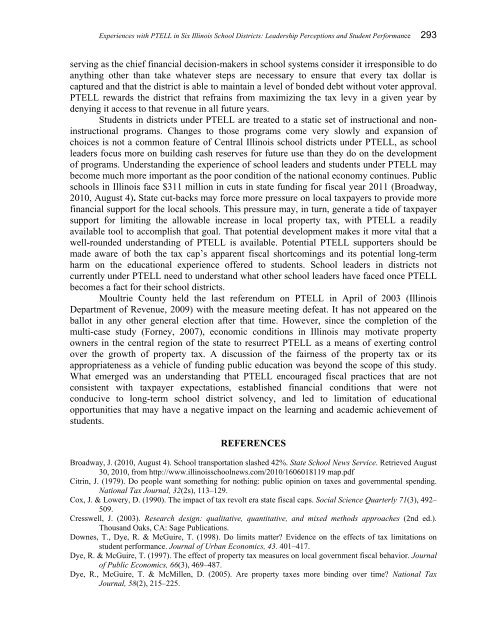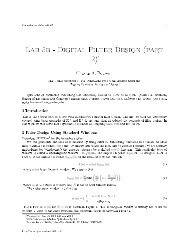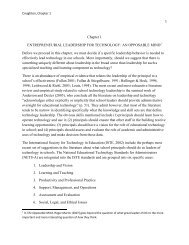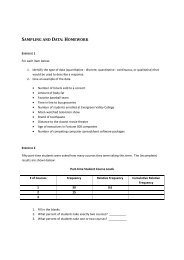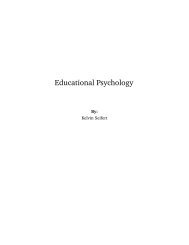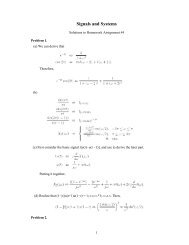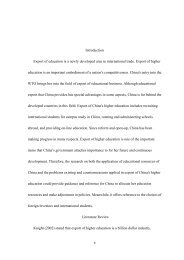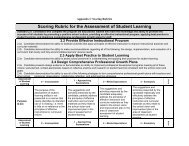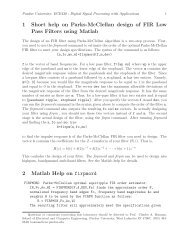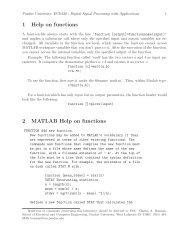Blazing New Trails - Connexions
Blazing New Trails - Connexions
Blazing New Trails - Connexions
You also want an ePaper? Increase the reach of your titles
YUMPU automatically turns print PDFs into web optimized ePapers that Google loves.
Experiences with PTELL in Six Illinois School Districts: Leadership Perceptions and Student Performance 293<br />
serving as the chief financial decision-makers in school systems consider it irresponsible to do<br />
anything other than take whatever steps are necessary to ensure that every tax dollar is<br />
captured and that the district is able to maintain a level of bonded debt without voter approval.<br />
PTELL rewards the district that refrains from maximizing the tax levy in a given year by<br />
denying it access to that revenue in all future years.<br />
Students in districts under PTELL are treated to a static set of instructional and noninstructional<br />
programs. Changes to those programs come very slowly and expansion of<br />
choices is not a common feature of Central Illinois school districts under PTELL, as school<br />
leaders focus more on building cash reserves for future use than they do on the development<br />
of programs. Understanding the experience of school leaders and students under PTELL may<br />
become much more important as the poor condition of the national economy continues. Public<br />
schools in Illinois face $311 million in cuts in state funding for fiscal year 2011 (Broadway,<br />
2010, August 4). State cut-backs may force more pressure on local taxpayers to provide more<br />
financial support for the local schools. This pressure may, in turn, generate a tide of taxpayer<br />
support for limiting the allowable increase in local property tax, with PTELL a readily<br />
available tool to accomplish that goal. That potential development makes it more vital that a<br />
well-rounded understanding of PTELL is available. Potential PTELL supporters should be<br />
made aware of both the tax cap’s apparent fiscal shortcomings and its potential long-term<br />
harm on the educational experience offered to students. School leaders in districts not<br />
currently under PTELL need to understand what other school leaders have faced once PTELL<br />
becomes a fact for their school districts.<br />
Moultrie County held the last referendum on PTELL in April of 2003 (Illinois<br />
Department of Revenue, 2009) with the measure meeting defeat. It has not appeared on the<br />
ballot in any other general election after that time. However, since the completion of the<br />
multi-case study (Forney, 2007), economic conditions in Illinois may motivate property<br />
owners in the central region of the state to resurrect PTELL as a means of exerting control<br />
over the growth of property tax. A discussion of the fairness of the property tax or its<br />
appropriateness as a vehicle of funding public education was beyond the scope of this study.<br />
What emerged was an understanding that PTELL encouraged fiscal practices that are not<br />
consistent with taxpayer expectations, established financial conditions that were not<br />
conducive to long-term school district solvency, and led to limitation of educational<br />
opportunities that may have a negative impact on the learning and academic achievement of<br />
students.<br />
REFERENCES<br />
Broadway, J. (2010, August 4). School transportation slashed 42%. State School <strong>New</strong>s Service. Retrieved August<br />
30, 2010, from http://www.illinoisschoolnews.com/2010/1606018119 map.pdf<br />
Citrin, J. (1979). Do people want something for nothing: public opinion on taxes and governmental spending.<br />
National Tax Journal, 32(2s), 113–129.<br />
Cox, J. & Lowery, D. (1990). The impact of tax revolt era state fiscal caps. Social Science Quarterly 71(3), 492–<br />
509.<br />
Cresswell, J. (2003). Research design: qualitative, quantitative, and mixed methods approaches (2nd ed.).<br />
Thousand Oaks, CA: Sage Publications.<br />
Downes, T., Dye, R. & McGuire, T. (1998). Do limits matter? Evidence on the effects of tax limitations on<br />
student performance. Journal of Urban Economics, 43. 401–417.<br />
Dye, R. & McGuire, T. (1997). The effect of property tax measures on local government fiscal behavior. Journal<br />
of Public Economics, 66(3), 469–487.<br />
Dye, R., McGuire, T. & McMillen, D. (2005). Are property taxes more binding over time? National Tax<br />
Journal, 58(2), 215–225.


